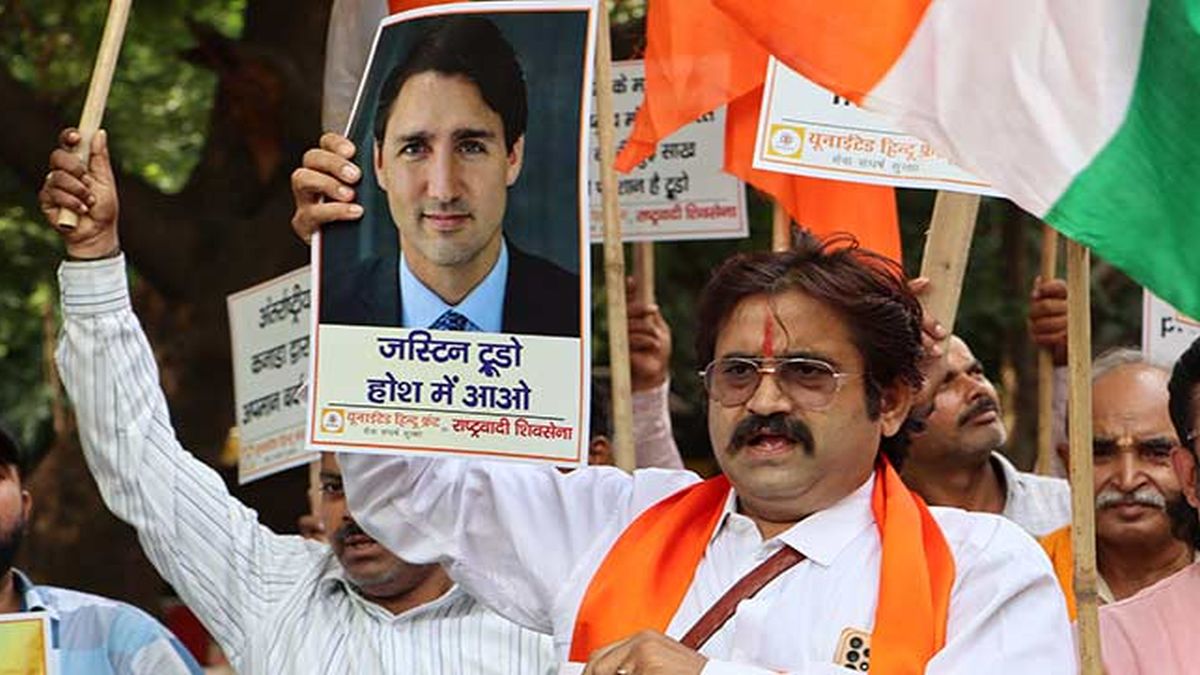India-Canada ties took a nosedive on Monday (October 14) when Prime Minister Justin Trudeau said the Royal Canadian Mounted Police (RCMP) uncovered “clear and compelling evidence” that Indian government agents had engaged in activities that threaten public safety in Canada.
This led to a flurry of diplomatic expulsions and withdrawals of diplomatic presence on both sides, with New Delhi also issuing, perhaps, one of its harshest statements, which said that the “the Trudeau government has consciously provided space to violent extremists and terrorists to harass, threaten and intimidate Indian diplomats and community leaders in Canada. This has included death threats to them and to Indian leaders. All these activities have been justified in the name of freedom of speech. Some individuals who have entered Canada illegally have been fast-tracked for citizenship. Multiple extradition requests from the Government of India in respect of terrorists and organised crime leaders living in Canada have been disregarded”.
The diplomatic fallout between the two evoked reactions from all around the world. Among the many was Michael Rubin, a senior fellow at the American Enterprise Institute and director of policy analysis at the Middle East Forum, who called for India to designate Canada as a state sponsor of terror .
But what does state sponsor of terror mean? Can India actually do so? We have the answers.
What is a state sponsor of terror?
Terrorism affects almost all corners of the world. However, there is no universal definition of terrorism. Security experts usually classify it into sub-types such as non-state terrorism, state terrorism or state-sponsored terrorism.
State terrorism is the kind through which a State illegitimately targets certain individuals or groups in order to instil fear in a target audience beyond the direct victim. For instance, many experts regard the German Nazi regime of 1930 to be an example of state terror.
Meanwhile, state-sponsored terrorism is when a terrorist group receives support from a State. This support could be in the form of funding, training, supply of weapons, providing shelter within its borders, as well as other ways of logistical and intelligence assistance.
Who can designate a country as state sponsor of terrorism?
State sponsor of terrorism is a status applied by the United States to certain countries for supporting acts of international terrorism. The designation can only be applied by the US Secretary of State, who is part of the US government. This status entails legal, economic and diplomatic consequences.
As the US State Department website mentions, countries determined by the Secretary of State to have repeatedly provided support for acts of international terrorism are designated pursuant to three laws: section 6(j) of the Export Administration Act, Section 40 of the Arms Export Control Act, and Section 620A of the Foreign Assistance Act.
Once designated as such, these countries face multiple sanctions, such as restrictions on US foreign assistance; a ban on defence exports and sales; certain controls over exports of dual-use items; and miscellaneous financial and other restrictions.
Moreover, these countries lose immunity in US federal and state courts. This means that the country would no longer be immune from lawsuits brought in the US by US nationals, members of the US armed forces and US government employees.
Currently, the US has placed four countries in this category — Cuba, the Democratic People’s Republic of Korea (North Korea), Iran, and Syria.
Once a country is designated, it remains a state sponsor of terrorism until the designation is rescinded in accordance with statutory criteria. For a country to be removed from the list, the President must submit a report to Congress certifying:
- There has been a fundamental change in the leadership and policies of the government of the country concerned
- The government is not supporting acts of international terrorism
- The government has provided assurances that it will not support acts of international terrorism in the future
The US has removed three countries from the terrorism list. In 1990, South Yemen was removed when it merged with North Yemen. Iraq was removed in 1982, then added back in 1990, and removed in 2004. Also, Libya was removed in 2006.
In April 2022, Ukrainian President Volodymyr Zelenskyy appealed to the US to add Russia to the State Department’s list of state sponsors of terrorism. Since then, the US House of Representatives and the Senate have passed resolutions calling on Secretary of State Antony Blinken to add Russia to the list, which he has refused so far.
The European Parliament can also designate a country as a state sponsor of terrorism — it declared Russia in November 2022. However, the European Parliament’s label is not legally binding and is symbolic in nature.
Canada also has a similar mechanism of adding a country as a sponsor of state terror under its State Immunity Act, with Iran and Syria listed as state supporters of terrorism since 2012.
What about India?
Currently, India doesn’t have any such mechanism in place. However, it can impose sanctions — either economic or defence-related. New Delhi could impose economic sanctions on Canada, which could hit Ottawa significantly. As a top trading partner, India could significantly harm Canada’s economy , which already faces a trade imbalance in India’s favour, reports India Today.
India could also close down its consulates, leaving the embassies functioning at a minimum level. It could also suspend visa services as it did last year for over a month.
New Delhi could also opt for freezing Canadian financial institutions and investments in India.
With inputs from agencies
)